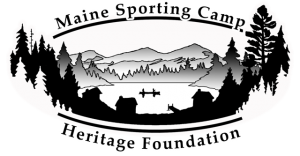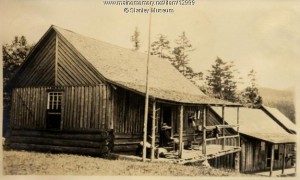The Foundation’s mission guides our decision-making when providing assistance to new and existing sporting camp owners. The Foundation assists sporting camp businesses so they can contribute economically to the community, employ local workers, are environmentally responsible, and provide the public with the unique culture, heritage and outdoor experiences that sporting camps have preserved for well over a century.
Qualifying for Assistance
The services offered by the Foundation to individual sporting camps depend on the specific goal and the complexity in delivering the service. The Foundation always considers the best means for accomplishing its mission. In some situations, Foundation staff may be available to provide assistance, especially where the Foundation staff might be more of an intermediary in making referrals to some other public or private agency, such as with SBA or USDA loan programs.
In other instances, the technical or time requirements may exceed the capacity of Foundation staff, and the Foundation will solicit outside vendors such as private businesses or various nonprofit agencies that exist to perform the necessary services. Examples of these might be in contracting with an independent forester to assess special habitats and formulate compatible forestry and recreation management plans, or by partnering with public agencies to provide workforce training.
Other assistance is targeted to address serious underlying structural issues common to old (up to 100 years) log style buildings, such as preventing further decay of the assets and subsequent decline in the survival rate of these businesses. In the short term this need may be significant due to the existence of prolonged maintenance avoidance by many sporting camps due to lack of financial resources. In the long term, our goal is to make this a minor consideration.
Assistance that Meets the Foundation’s Mission
The Foundation provides assistance that will:
- Preserve the “Maine Sporting Camp” culture, heritage, architecture and outdoor traditions that began in the mid-1800’s, and were documented by many such as Henry David Thoreau.
- Provide an opportunity for sporting camps and local businesses to become self sustainable, improve the economy of depressed regions of Maine, and to bring a positive change for the borrower, the area’s unemployed, or seasonally employed. We are interested in the long term employment potential of each loan or investment and we ask our borrowers to work with staff to open new job opportunities to those who are in need of employment. For example, we look to assist businesses that plan to hire and train new employees, train/hire/apprentice local youth, or improve part-time or seasonal positions to full-time or year-round employment.
- Protect and improve the stewardship of natural resources, so it may be enjoyed by the public and become an economic asset to the local area. The Foundation is committed to helping sporting camps succeed while preserving the quality of Maine’s environment. One depends upon the other. We encourage and help sporting camps to identify the ecological aspects of their surroundings, and to developing practices that benefit both the environment and the business’ bottom line. Our interest is in assisting businesses that provide services that are environmentally friendly and sustainable.
- Generate a viable and sustainable financial return, either by maintaining or creating profits, return on investment or a tangible asset.
Identifying & Qualifying Who Needs Assistance
The Foundation maintains a comprehensive database that identifies every commercially active sporting camp (i.e., those that are open to the general public), and sporting camps that have already been closed or converted to private, exclusive use. The Foundation analyzes this data, as well as inquiries from businesses or organizations that may request assistance, to identify opportunities for prioritizing and offering assistance.
The information collected by this database includes:
- The ownership structure of each camp and surrounding land area;
- Whether the business faces land ownership threats, and how immediate those threats might be;
- An overview of the business’ financial condition and sustainability;
- The business’ staffing and employment opportunities;
- The age, history and physical condition of the buildings and equipment;
- The business’ capacity to develop new markets and services;
- The surrounding natural resources, outstanding wildlife, habitats, eco-systems and scenic values that might be used for improving the business and local community’s economic condition.
Contribution to Foundation’s Mission
Assistance programs and individuals selected for assistance must contribute to advancing the Foundation’s mission. Several of the questions used to determine this are:
- Will the assistance serve to preserve the “Maine Sporting Camp” culture, heritage, architecture and outdoor traditions that began in the mid-1800’s, and were documented by many such as Henry David Thoreau?
- Will the assistance help the sporting camp and local community to become self sustainable, improve the economy of depressed regions of Maine, and to bring a positive change for the business owner, the area’s unemployed, or seasonally employed?
- Will the assistance help increase the area’s long term employment opportunities, or create new job opportunities for those who are in need of employment?
- Will the assistance help businesses hire and train new employees, train/hire/apprentice local youth, or upgrade part-time or seasonal positions to full-time or year-round employment?
- Will the assistance help protect and improve the stewardship of natural resources, so it may be enjoyed by the public and become an economic asset to the local area?
- Will the assistance help identify the ecological aspects of the surroundings, and develop practices that benefit both the environment and the business’ bottom line?
- Will the assistance help businesses and communities provide services that are environmentally friendly and sustainable?
Determining an Assistance Plan
Depending on the type of assistance needed, such as business counseling, conservation & service development, financial assistance, grants, or workforce training, criteria that will be considered in providing assistance include:
- Immediacy of need – without assistance, will the business or asset be likely to cease operation or deteriorate beyond reasonable repair;
- Level of deterioration that will be corrected;
- Opportunity for financial sustainability as a result of the assistance;
- Will the assistance help lead to a viable and sustainable financial return, either by maintaining or creating profits, return on investment or a tangible asset;
- The business’ willingness to try new approaches, including land conservation, land management planning, service and management skill improvements;
- Potential for positive impacts on other local businesses (and local economy)
- Potential for improving local employment opportunities
- Financial statements demonstrating the need;
- Availability of other supporting resources – can a business owner or operator demonstrate that either they were unable to obtain commercial financing for these purposes, or that the costs of commercial financing would undermine the economic viability of the business;
- Whether the benefit provided to any individual or business would be incidental when compared to the broader charitable objective that would be accomplished as a result of the assistance being provided – that is, conservation, outdoor recreation opportunity and economic development in a disadvantaged region, and whether the charitable objective could be accomplish in a manner that did not result in any benefit being provided to an individual or business.


